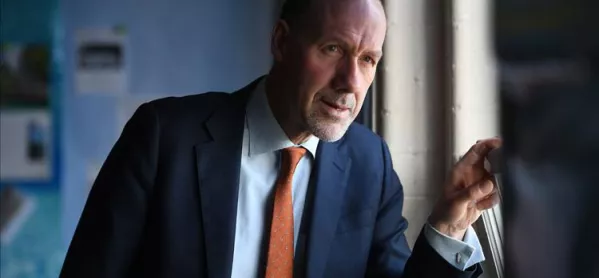- Home
- Exclusive: ‘Back off our curriculum,’ heads tell ministers and Ofsted
Exclusive: ‘Back off our curriculum,’ heads tell ministers and Ofsted

A heads’ leader has said ministers and Ofsted should leave decisions on what is taught in schools to the teaching profession.
Association of School and College Leaders general secretary Geoff Barton has said that school leaders and teachers must be given room to take decisions on the “leadership of learning” to shape their own curriculum.
He told Tes that schools have been left “teaching someone else’s curriculum”, suggesting the problems began with the famous “secret garden” speech from James Callaghan in 1976. It saw the then prime minister set out “the strong case for the so-called core curriculum and basic knowledge”.
Mr Barton has welcomed Ofsted’s plan to focus on curriculum in the new inspection framework but said the inspectorate should not have a pre-judged idea of what a good curriculum should look like.
“Schools need to be given breathing space to take ownership of the leadership of learning,” Mr Barton said. “It goes back to the secret garden speech.
“Teachers and school leaders need to stop delivering other people’s curriculum. I am a product of the 70s and we wouldn’t want to go back to that. There was some good schools but some mediocre stuff.
“We will always need to have a core curriculum of the best of what has been thought and said. The trouble is that from the New Labour age of National Strategies to Nick Gibb there has been endless tinkering by politicians and the education sector and the discussion has not been opened up to employers and parents about what skills young people need, about what young people they would like to see developed.”
Ofsted is launching a new framework next year which will place an increased emphasis on a school’s curriculum and give less weight to raw exam results.
However, there have been questions about whether Ofsted can judge schools on this without having a pre-determined idea of what a good curriculum looks like.
Ofsted has insisted that it does not favour a particular approach to school curriculum.
Mr Barton said: “It is important that Ofsted does not have a pre-judged idea of what a school curriculum should look like.”
“It is important that it is not ideological. Ofsted will expect a curriculum to be broad and balanced but I think the most important question they could ask school leaders is what is distinctive about what you are doing, what you teach and why it is important to your school?”
He said that for the new inspection framework to be a success, schools needed breathing space.
An Ofsted spokesman said: “Most school leaders and teachers have welcomed our new focus on the curriculum, which is the substance of education.
“We’re pleased so many people are welcoming the proposed changes to the Ofsted framework. And, as HM chief inspector Amanda Spielman said in a speech last week, our ‘focus on substance will help to tackle excessive workload’ by moving the conversation away from data generation and towards the real substance of education.
“School leaders and teachers can be assured that we have no preferred approach to the curriculum. Again, as Amanda Spielman said last week, ‘our curriculum research showed quite clearly that it’s possible to acknowledge a range of successful curricular approaches - approaches that cross any perceived ideological divide’.”
This story is based on a longer article on the future of the school curriculum appearing in Friday’s edition of Tes magazine, available in all good newsagents. To download the digital edition, Android users can click here and iOS users can click here.
Register with Tes and you can read two free articles every month plus you'll have access to our range of award-winning newsletters.
Keep reading with our special offer!
You’ve reached your limit of free articles this month.
- Unlimited access to all Tes magazine content
- Save your favourite articles and gift them to your colleagues
- Exclusive subscriber-only stories
- Over 200,000 archived articles
- Unlimited access to all Tes magazine content
- Save your favourite articles and gift them to your colleagues
- Exclusive subscriber-only stories
- Over 200,000 archived articles



